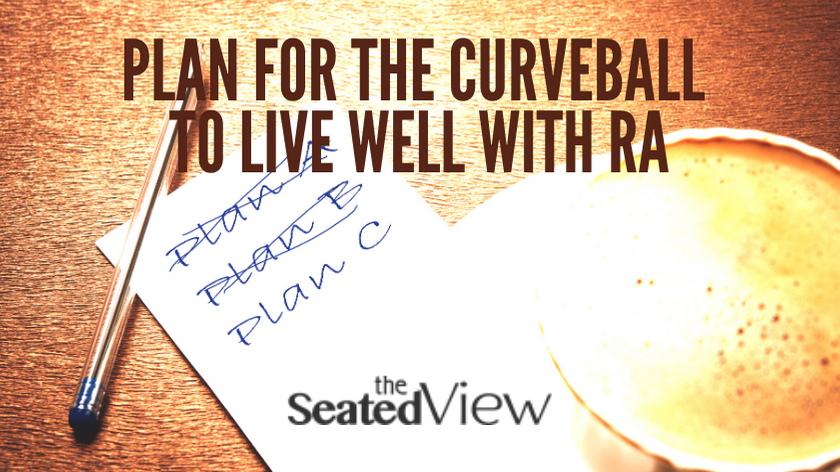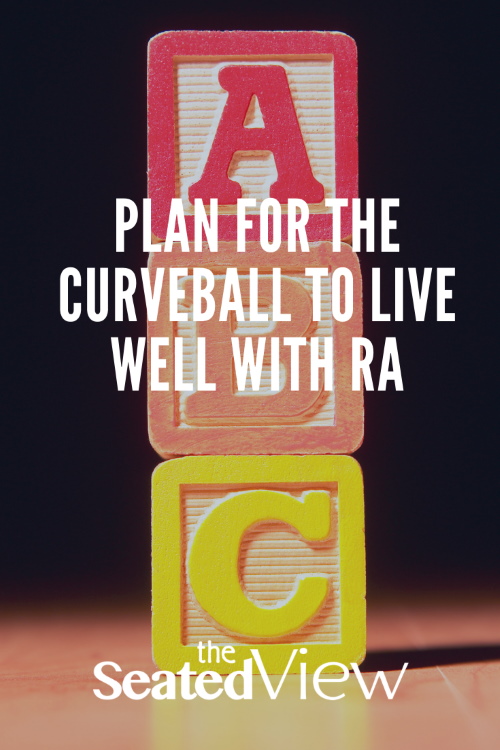Plan for the Curveball to Live Well with RA

When rheumatoid arthritis (RA) makes everything in your life uncertain, you can count on one thing: any plans you’ve had the audacity to make dispersing in the air as if hit by a magic spell. To paraphrase John Lennon, chronic illness is what happens when you make any plans. And when it happens often enough, it gets real tempting to stop making plans at all. But that’s no way to live your life. So how do you work around this huge boulder in your path to a relatively normal life?
By having more than one basket for your eggs! (bear with me, this will make sense in a moment)
When you invest for your retirement, they say to make sure that you diversify your investments. That way, if one isn’t doing well, the return on another can offset the loss. When you’re trying to find a job, they — the ephemeral ‘they’ — advise you to send out as many resumes as possible instead of just applying to one job at a time. If one potential employer can’t recognize the wonder that is you, maybe another will.
At the start of last year, I came up with a system I non-creatively call #3Things. On the first Thursday of every month, I host a Facebook live where those of you who want to play long choose three things to work on over the next month. They should be small and ridiculously attainable, so it’s something you can do even on your worst day. Because success breeds motivation, this system helps you feel more accomplished, less frustrated, and much less likely to be mean to yourself about how you don’t get anything done.
This system has worked really well for me and others. Every month, I’ve learned something new about myself — how I operate and especially how I get in my own way. One of the ways I trip myself up is by overestimating what I can do and underestimate how long things take. Which means I always feel behind, always feel like I am not meeting my goals, always feel as if I’ll never get to where I want to be.
Spending a lifetime with RA has taught me many things, but one of the biggest is this: sometimes the way to get to the other side of an obstacle in your path is to walk around it, rather than trying to blast through it. So if life, my chronic illness, and my overly optimistic idea of my own abilities are the obstacles in my way and trying to blast through it is not working — because of course it’s not working — maybe it’s time to walk around that big boulder.

What generally happens when you’ve made plans and then flare (because RA is if nothing but cantankerous in this way)? Plans are cancelled or maybe the plans move forward and you stay home on the couch, feeling upset because once again, you can’t participate.
And that right there is the problem: we only have one plan and there’s no backup in case life (or your RA) gets in the way. So I asked myself what might happen if we had more than one plan?
Let’s pick something fun and for a moment pretend that COVID-19 never happened. Say Plan A is dinner out with friends on Friday. Friday morning, you wake up with a flare that’s big enough that you can’t go. Under normal circumstances, you’d bow out and either avoid the social media photos of your friends having dinner or when seeing them, have a little cry.
But what if you had a Plan B? On Friday morning, you wake up in a flare that prevents you from going out for dinner, but you and your friend built in an alternate event. They’ll pick up take-out and come hang out at your place, while you all eat lovely food and laugh until it hurts. But it doesn’t stop there, because you and your friends are smart enough to also have a Plan C. If you are so wrecked that it’s too much to have several people come over and spending the entire night having a good time, you’ll all get together on Zoom, have dinner together and after about an hour, wish each other well and go do other things. For you, that most likely means crawling into bed, but…! You still had a good time with your friends.

You can also apply it to a chore or a work task. My Plan A might be spending several hours writing, then doing some edits on something else, plus a number of home-related tasks. My Plan B could be writing for half that time, postponing the editing, and doing only one home-related task. If I wake up with high pain levels, a migraine, or a brain that only wants to curl up into the fetal position, my Plan C could be sitting by the lake in the sunshine while listening to a podcast about writing and, if I felt okay when I got home, make some notes about the essay or chapter I’m working on. I may not have written anything, but instead of feeling — let’s get completely honest here — like a failure, I can look back on the day and know that I made a bit of progress, while also letting my body get a vote.
And because I did that, I’m more likely to be able to follow my Plan A the next day and maybe the day after, as well. By “calling it” and doing what my body needs, I set myself up for a better day tomorrow.
Assuming that a curveball will happen, and planning for what to do when it does, can help you continue to live your life. It can get you further towards your goal, continue to have fun, and not miss out on all the things that are part of being you. Instead of feeling isolated, depressed, and as if RA has stolen everything, you still get there. It may be in a different way and on a somewhat different schedule, but that happens to everyone. Otherwise John Lennon would never have said that “life is what happens to you while you’re busy making other plans.”
Want to test it out? Watch my August #3Things to learn details on how to implement this idea. You can download my #3Things free tracking sheets and the August “body tracker” tracker on my Book page.
Tag: #3Things, cancelled plans, chronic illness, flares, frustration, motivation, rheum, rheumatoid arthritis, rheumatoid disease
13 Comments
Read More
Discover what else I've been writing about...
















These days Sheryl only allows me Plan A and it is always the same. Do what Sheryl says. Her other plans are A, B or C, are known only to her. But I do love that my choices are both limited and well, limited. She tells me it works well.
This sounds like a really good approach to everything in life. A detailed and informative explanation. It may sound trivial in reference to more serious issues in life, but from now on this is how I will plan my weekends. Plan A. Plan B… I usually have only one plan and if it doesn’t work out we all spend the day aimlessly! Thank you for sharing.
I really enjoyed this information. Normally I just go with Plan A, and never think about plan B. I guess I could start, and it would help when plan A falls through. I love the idea of #3things. Just being able to discuss three things that you are wanting to work on with others really does help. That can be great motivation for all who participates!
I have friends who have RA – this is a really great post with tips that would apply to life as well
I have never heard of RA before, but I love that you have taken time out to write this and raise awareness x
Having plans A, B, C.. is such a great idea! Prevents disappointment and makes you feel still in control.
That is a great way of looking at things. While I will say that I’ve set multiple plans like this for bigger aspects of my life like my overall career goals, my finanical planning, etc., I’ve never considered applying the same approach to my day to day life. As someone living with depression, this would be a great way to set myself up to handle those ‘off’ days.
I love this idea. If Covid has taught us anything, it’s that everyone needs to have a Plan B and C. This is a great way to look at things and also to involve your friends – I’m sure it takes away a lot of stress for you to know that no matter how you feel on a given day, there is a plan for that situation.
I also love the idea of your 3Things, that sounds really motivating and I’m sure the social aspect of sharing your goals with others helps to keep everyone on track.
Yes having various plans and being ready for everything going south is something I am still learning. great post!
I love this idea of having plan A,B & C and it is applicable actually in every sphere of life. My sister was diagnosed with RA at a very early age and I remember a lot of our family plans would go haywire because of sudden attacks that she would get. Nice read.
It is so interesting that even being a prepper, I don’t have backup plans for social or daily plans. I sort of get up and just start going at it, writing, editing, hunting ideas down for my product line, and so much more. My problem is that without a backup plan, I do fail periodically, and especially the last two weeks. My hand has been acting up again and the pain is ridiculous. I’ve been seriously struggling with the fact I can’t get it all done, plus have a life too. You’ve reminded me to be more adaptable and allow myself the room to change plans. I’d also like to jump into your FB live challenge the next time you do it!
This quote really stuck with me: “sometimes the way to get to the other side of an obstacle in your path is to walk around it, rather than trying to blast through it”. It sounds like you are taking the best care of yourself that you can and going easy on yourself
Perfect advice! I wish I had this perspective when I was first diagnosed with autoimmune disease. I would have been much better equipped to cope in a more productive way. I’ve found that chronic illness makes us very adaptable – we have to be because our diseases aren’t predictable.